Synthesis Essay: New Technology and its Impact on Journalism
VerifiedAdded on 2023/04/20
|7
|1562
|74
Essay
AI Summary
This essay examines the multifaceted impact of new technologies on 21st-century journalism, acknowledging both its accelerating effects on professional journalism and the challenges it poses to traditional forms. It discusses how journalists utilize new media for various purposes, including news dissemination and business contacts, while also highlighting concerns about the quality and credibility of news. The essay explores the use of platforms like Twitter for political information and the rise of participatory journalism through blogs, noting potential biases and the violation of journalistic norms. It further delves into the importance of credibility and reliability in online news sources, contrasting them with traditional journalism's emphasis on fairness. Ultimately, the essay emphasizes the necessity for journalists to adapt to the changing technological landscape while upholding ethical standards, addressing information asymmetry, and fostering domestic and international cooperation to ensure the integrity of news in the digital age. Desklib offers similar solved assignments and past papers for students.
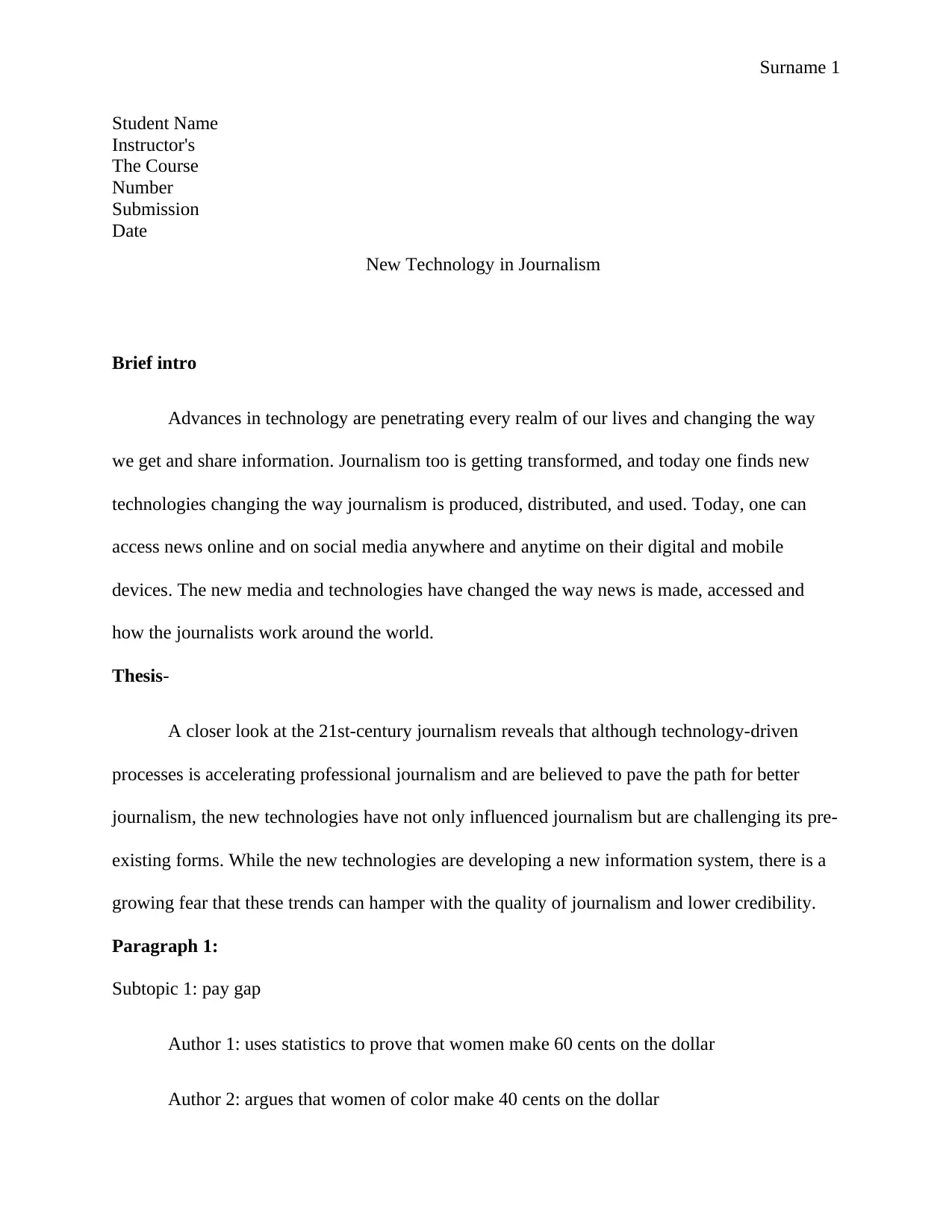
Surname 1
Student Name
Instructor's
The Course
Number
Submission
Date
New Technology in Journalism
Brief intro
Advances in technology are penetrating every realm of our lives and changing the way
we get and share information. Journalism too is getting transformed, and today one finds new
technologies changing the way journalism is produced, distributed, and used. Today, one can
access news online and on social media anywhere and anytime on their digital and mobile
devices. The new media and technologies have changed the way news is made, accessed and
how the journalists work around the world.
Thesis-
A closer look at the 21st-century journalism reveals that although technology-driven
processes is accelerating professional journalism and are believed to pave the path for better
journalism, the new technologies have not only influenced journalism but are challenging its pre-
existing forms. While the new technologies are developing a new information system, there is a
growing fear that these trends can hamper with the quality of journalism and lower credibility.
Paragraph 1:
Subtopic 1: pay gap
Author 1: uses statistics to prove that women make 60 cents on the dollar
Author 2: argues that women of color make 40 cents on the dollar
Student Name
Instructor's
The Course
Number
Submission
Date
New Technology in Journalism
Brief intro
Advances in technology are penetrating every realm of our lives and changing the way
we get and share information. Journalism too is getting transformed, and today one finds new
technologies changing the way journalism is produced, distributed, and used. Today, one can
access news online and on social media anywhere and anytime on their digital and mobile
devices. The new media and technologies have changed the way news is made, accessed and
how the journalists work around the world.
Thesis-
A closer look at the 21st-century journalism reveals that although technology-driven
processes is accelerating professional journalism and are believed to pave the path for better
journalism, the new technologies have not only influenced journalism but are challenging its pre-
existing forms. While the new technologies are developing a new information system, there is a
growing fear that these trends can hamper with the quality of journalism and lower credibility.
Paragraph 1:
Subtopic 1: pay gap
Author 1: uses statistics to prove that women make 60 cents on the dollar
Author 2: argues that women of color make 40 cents on the dollar
Paraphrase This Document
Need a fresh take? Get an instant paraphrase of this document with our AI Paraphraser
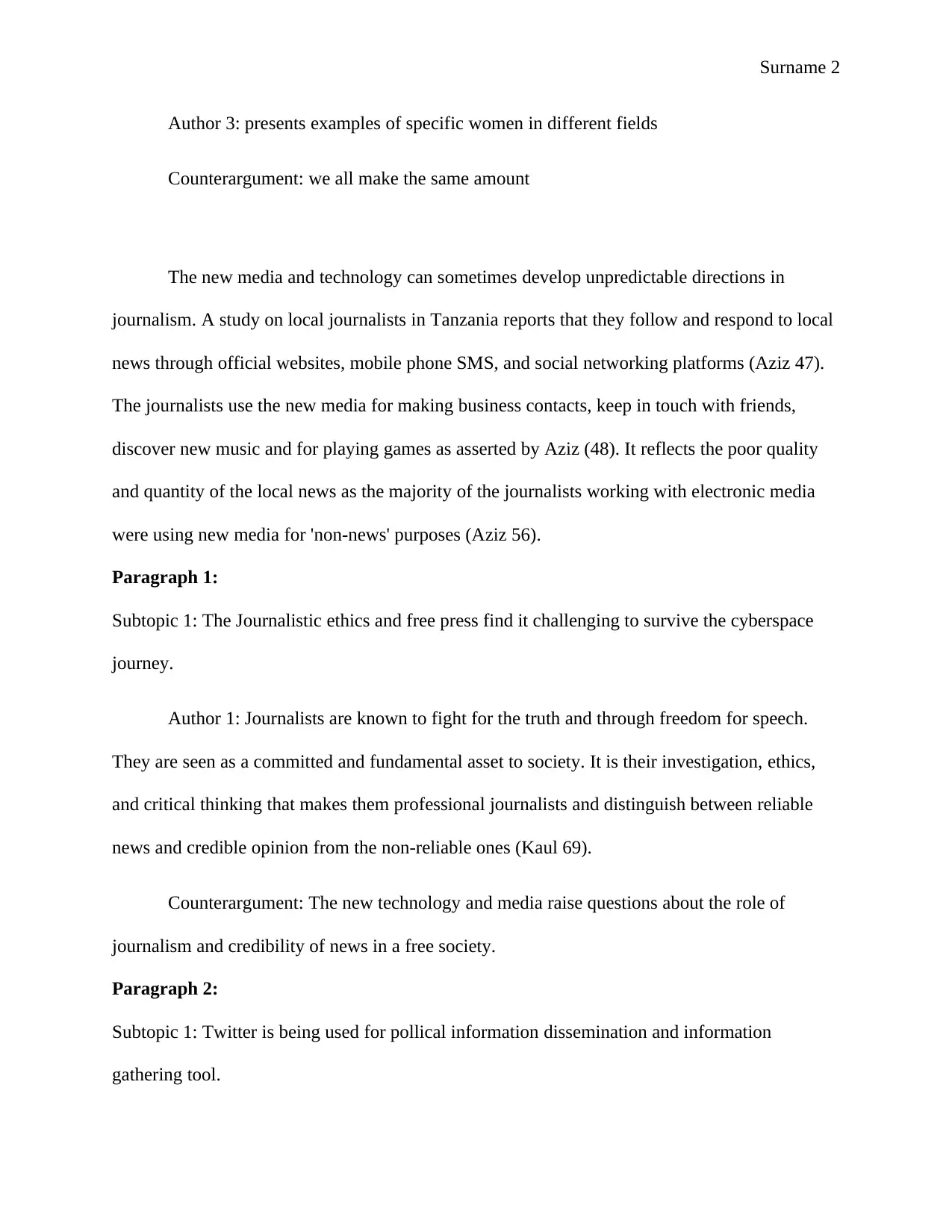
Surname 2
Author 3: presents examples of specific women in different fields
Counterargument: we all make the same amount
The new media and technology can sometimes develop unpredictable directions in
journalism. A study on local journalists in Tanzania reports that they follow and respond to local
news through official websites, mobile phone SMS, and social networking platforms (Aziz 47).
The journalists use the new media for making business contacts, keep in touch with friends,
discover new music and for playing games as asserted by Aziz (48). It reflects the poor quality
and quantity of the local news as the majority of the journalists working with electronic media
were using new media for 'non-news' purposes (Aziz 56).
Paragraph 1:
Subtopic 1: The Journalistic ethics and free press find it challenging to survive the cyberspace
journey.
Author 1: Journalists are known to fight for the truth and through freedom for speech.
They are seen as a committed and fundamental asset to society. It is their investigation, ethics,
and critical thinking that makes them professional journalists and distinguish between reliable
news and credible opinion from the non-reliable ones (Kaul 69).
Counterargument: The new technology and media raise questions about the role of
journalism and credibility of news in a free society.
Paragraph 2:
Subtopic 1: Twitter is being used for pollical information dissemination and information
gathering tool.
Author 3: presents examples of specific women in different fields
Counterargument: we all make the same amount
The new media and technology can sometimes develop unpredictable directions in
journalism. A study on local journalists in Tanzania reports that they follow and respond to local
news through official websites, mobile phone SMS, and social networking platforms (Aziz 47).
The journalists use the new media for making business contacts, keep in touch with friends,
discover new music and for playing games as asserted by Aziz (48). It reflects the poor quality
and quantity of the local news as the majority of the journalists working with electronic media
were using new media for 'non-news' purposes (Aziz 56).
Paragraph 1:
Subtopic 1: The Journalistic ethics and free press find it challenging to survive the cyberspace
journey.
Author 1: Journalists are known to fight for the truth and through freedom for speech.
They are seen as a committed and fundamental asset to society. It is their investigation, ethics,
and critical thinking that makes them professional journalists and distinguish between reliable
news and credible opinion from the non-reliable ones (Kaul 69).
Counterargument: The new technology and media raise questions about the role of
journalism and credibility of news in a free society.
Paragraph 2:
Subtopic 1: Twitter is being used for pollical information dissemination and information
gathering tool.
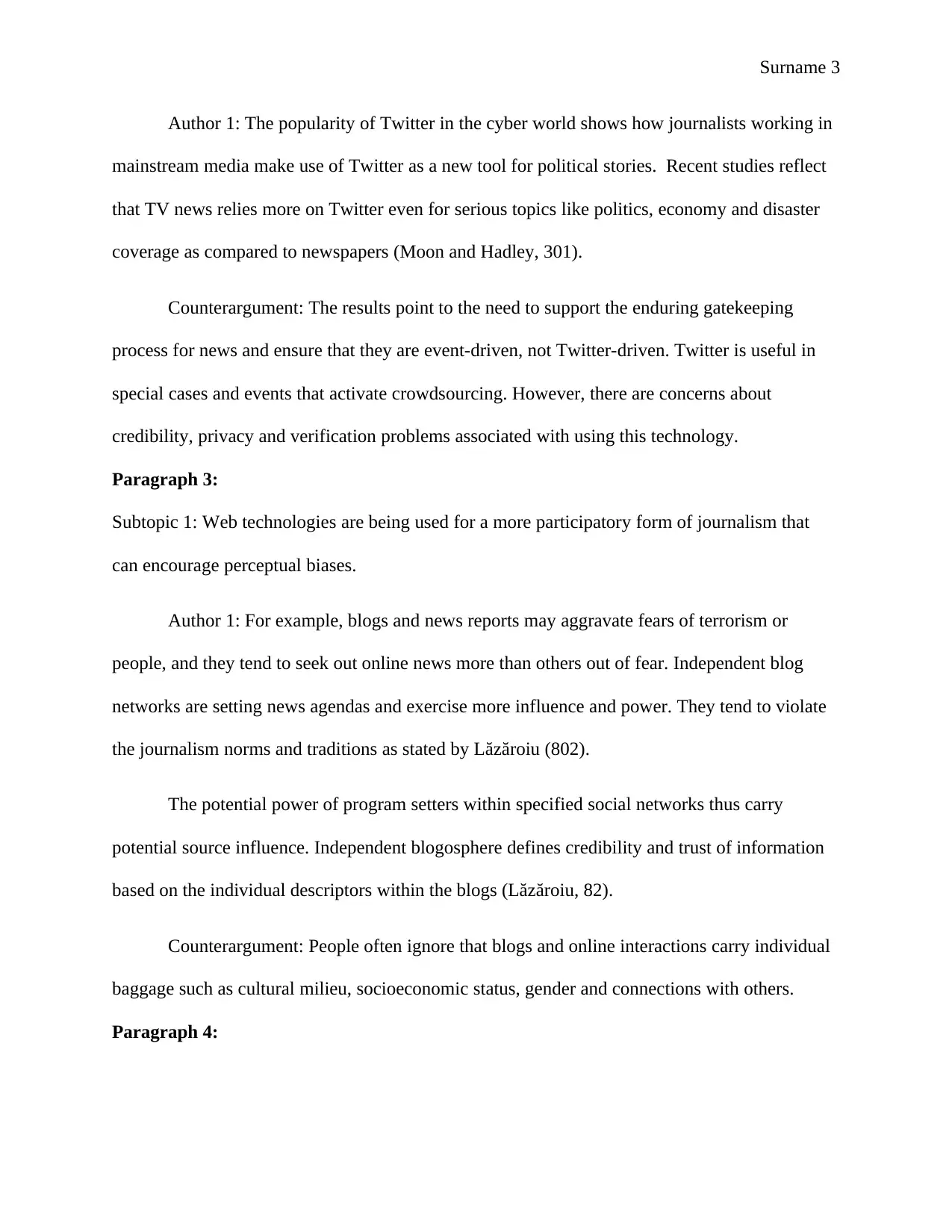
Surname 3
Author 1: The popularity of Twitter in the cyber world shows how journalists working in
mainstream media make use of Twitter as a new tool for political stories. Recent studies reflect
that TV news relies more on Twitter even for serious topics like politics, economy and disaster
coverage as compared to newspapers (Moon and Hadley, 301).
Counterargument: The results point to the need to support the enduring gatekeeping
process for news and ensure that they are event-driven, not Twitter-driven. Twitter is useful in
special cases and events that activate crowdsourcing. However, there are concerns about
credibility, privacy and verification problems associated with using this technology.
Paragraph 3:
Subtopic 1: Web technologies are being used for a more participatory form of journalism that
can encourage perceptual biases.
Author 1: For example, blogs and news reports may aggravate fears of terrorism or
people, and they tend to seek out online news more than others out of fear. Independent blog
networks are setting news agendas and exercise more influence and power. They tend to violate
the journalism norms and traditions as stated by Lăzăroiu (802).
The potential power of program setters within specified social networks thus carry
potential source influence. Independent blogosphere defines credibility and trust of information
based on the individual descriptors within the blogs (Lăzăroiu, 82).
Counterargument: People often ignore that blogs and online interactions carry individual
baggage such as cultural milieu, socioeconomic status, gender and connections with others.
Paragraph 4:
Author 1: The popularity of Twitter in the cyber world shows how journalists working in
mainstream media make use of Twitter as a new tool for political stories. Recent studies reflect
that TV news relies more on Twitter even for serious topics like politics, economy and disaster
coverage as compared to newspapers (Moon and Hadley, 301).
Counterargument: The results point to the need to support the enduring gatekeeping
process for news and ensure that they are event-driven, not Twitter-driven. Twitter is useful in
special cases and events that activate crowdsourcing. However, there are concerns about
credibility, privacy and verification problems associated with using this technology.
Paragraph 3:
Subtopic 1: Web technologies are being used for a more participatory form of journalism that
can encourage perceptual biases.
Author 1: For example, blogs and news reports may aggravate fears of terrorism or
people, and they tend to seek out online news more than others out of fear. Independent blog
networks are setting news agendas and exercise more influence and power. They tend to violate
the journalism norms and traditions as stated by Lăzăroiu (802).
The potential power of program setters within specified social networks thus carry
potential source influence. Independent blogosphere defines credibility and trust of information
based on the individual descriptors within the blogs (Lăzăroiu, 82).
Counterargument: People often ignore that blogs and online interactions carry individual
baggage such as cultural milieu, socioeconomic status, gender and connections with others.
Paragraph 4:
⊘ This is a preview!⊘
Do you want full access?
Subscribe today to unlock all pages.

Trusted by 1+ million students worldwide
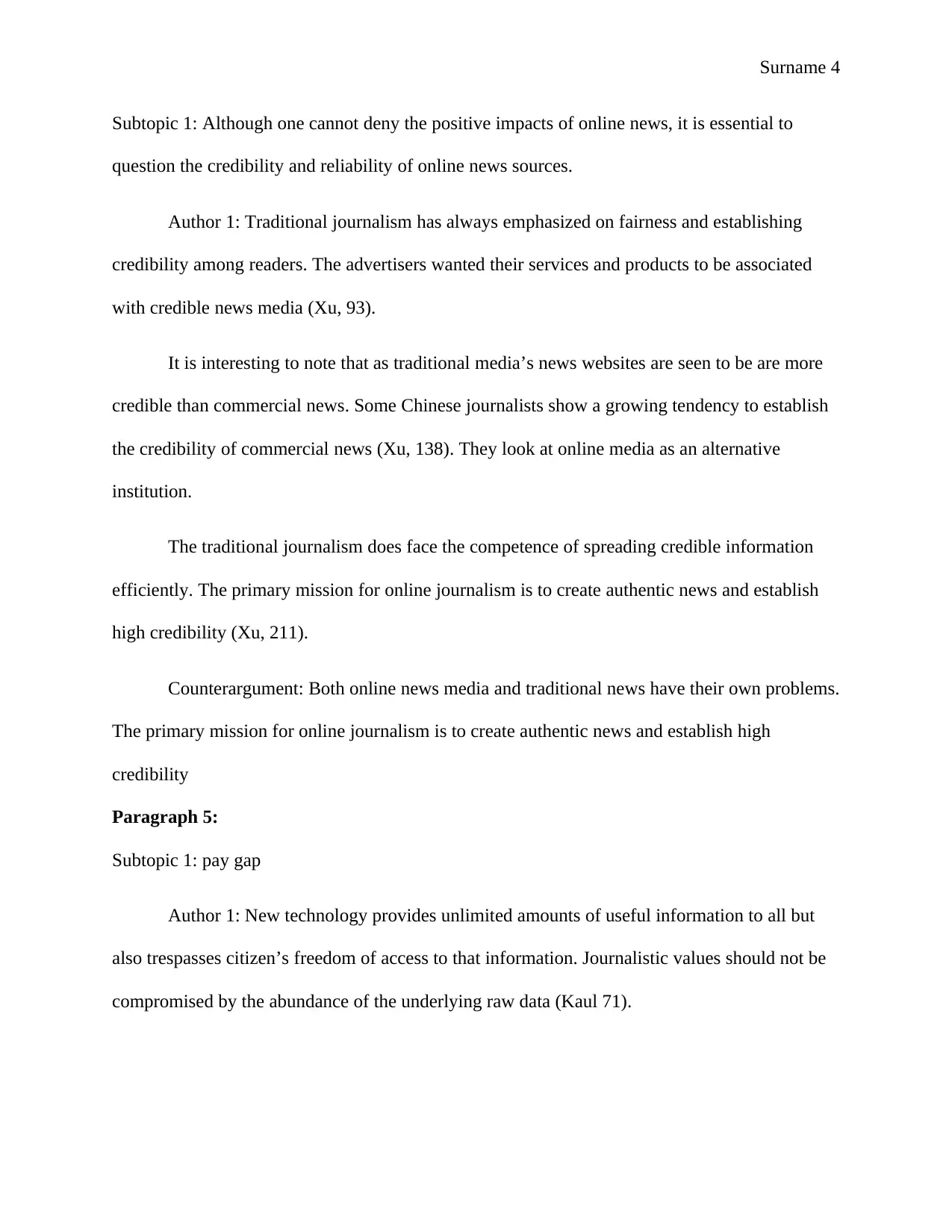
Surname 4
Subtopic 1: Although one cannot deny the positive impacts of online news, it is essential to
question the credibility and reliability of online news sources.
Author 1: Traditional journalism has always emphasized on fairness and establishing
credibility among readers. The advertisers wanted their services and products to be associated
with credible news media (Xu, 93).
It is interesting to note that as traditional media’s news websites are seen to be are more
credible than commercial news. Some Chinese journalists show a growing tendency to establish
the credibility of commercial news (Xu, 138). They look at online media as an alternative
institution.
The traditional journalism does face the competence of spreading credible information
efficiently. The primary mission for online journalism is to create authentic news and establish
high credibility (Xu, 211).
Counterargument: Both online news media and traditional news have their own problems.
The primary mission for online journalism is to create authentic news and establish high
credibility
Paragraph 5:
Subtopic 1: pay gap
Author 1: New technology provides unlimited amounts of useful information to all but
also trespasses citizen’s freedom of access to that information. Journalistic values should not be
compromised by the abundance of the underlying raw data (Kaul 71).
Subtopic 1: Although one cannot deny the positive impacts of online news, it is essential to
question the credibility and reliability of online news sources.
Author 1: Traditional journalism has always emphasized on fairness and establishing
credibility among readers. The advertisers wanted their services and products to be associated
with credible news media (Xu, 93).
It is interesting to note that as traditional media’s news websites are seen to be are more
credible than commercial news. Some Chinese journalists show a growing tendency to establish
the credibility of commercial news (Xu, 138). They look at online media as an alternative
institution.
The traditional journalism does face the competence of spreading credible information
efficiently. The primary mission for online journalism is to create authentic news and establish
high credibility (Xu, 211).
Counterargument: Both online news media and traditional news have their own problems.
The primary mission for online journalism is to create authentic news and establish high
credibility
Paragraph 5:
Subtopic 1: pay gap
Author 1: New technology provides unlimited amounts of useful information to all but
also trespasses citizen’s freedom of access to that information. Journalistic values should not be
compromised by the abundance of the underlying raw data (Kaul 71).
Paraphrase This Document
Need a fresh take? Get an instant paraphrase of this document with our AI Paraphraser
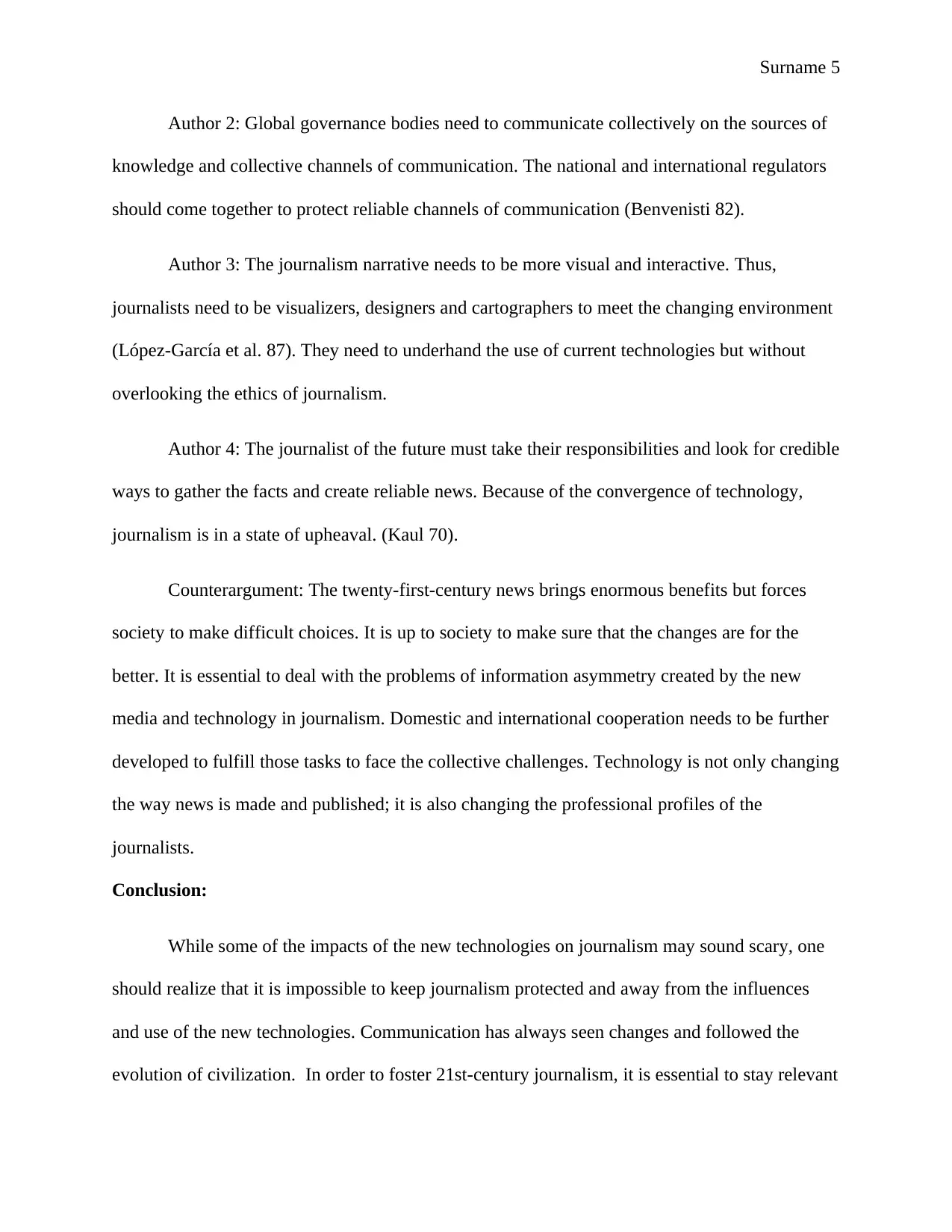
Surname 5
Author 2: Global governance bodies need to communicate collectively on the sources of
knowledge and collective channels of communication. The national and international regulators
should come together to protect reliable channels of communication (Benvenisti 82).
Author 3: The journalism narrative needs to be more visual and interactive. Thus,
journalists need to be visualizers, designers and cartographers to meet the changing environment
(López-García et al. 87). They need to underhand the use of current technologies but without
overlooking the ethics of journalism.
Author 4: The journalist of the future must take their responsibilities and look for credible
ways to gather the facts and create reliable news. Because of the convergence of technology,
journalism is in a state of upheaval. (Kaul 70).
Counterargument: The twenty-first-century news brings enormous benefits but forces
society to make difficult choices. It is up to society to make sure that the changes are for the
better. It is essential to deal with the problems of information asymmetry created by the new
media and technology in journalism. Domestic and international cooperation needs to be further
developed to fulfill those tasks to face the collective challenges. Technology is not only changing
the way news is made and published; it is also changing the professional profiles of the
journalists.
Conclusion:
While some of the impacts of the new technologies on journalism may sound scary, one
should realize that it is impossible to keep journalism protected and away from the influences
and use of the new technologies. Communication has always seen changes and followed the
evolution of civilization. In order to foster 21st-century journalism, it is essential to stay relevant
Author 2: Global governance bodies need to communicate collectively on the sources of
knowledge and collective channels of communication. The national and international regulators
should come together to protect reliable channels of communication (Benvenisti 82).
Author 3: The journalism narrative needs to be more visual and interactive. Thus,
journalists need to be visualizers, designers and cartographers to meet the changing environment
(López-García et al. 87). They need to underhand the use of current technologies but without
overlooking the ethics of journalism.
Author 4: The journalist of the future must take their responsibilities and look for credible
ways to gather the facts and create reliable news. Because of the convergence of technology,
journalism is in a state of upheaval. (Kaul 70).
Counterargument: The twenty-first-century news brings enormous benefits but forces
society to make difficult choices. It is up to society to make sure that the changes are for the
better. It is essential to deal with the problems of information asymmetry created by the new
media and technology in journalism. Domestic and international cooperation needs to be further
developed to fulfill those tasks to face the collective challenges. Technology is not only changing
the way news is made and published; it is also changing the professional profiles of the
journalists.
Conclusion:
While some of the impacts of the new technologies on journalism may sound scary, one
should realize that it is impossible to keep journalism protected and away from the influences
and use of the new technologies. Communication has always seen changes and followed the
evolution of civilization. In order to foster 21st-century journalism, it is essential to stay relevant
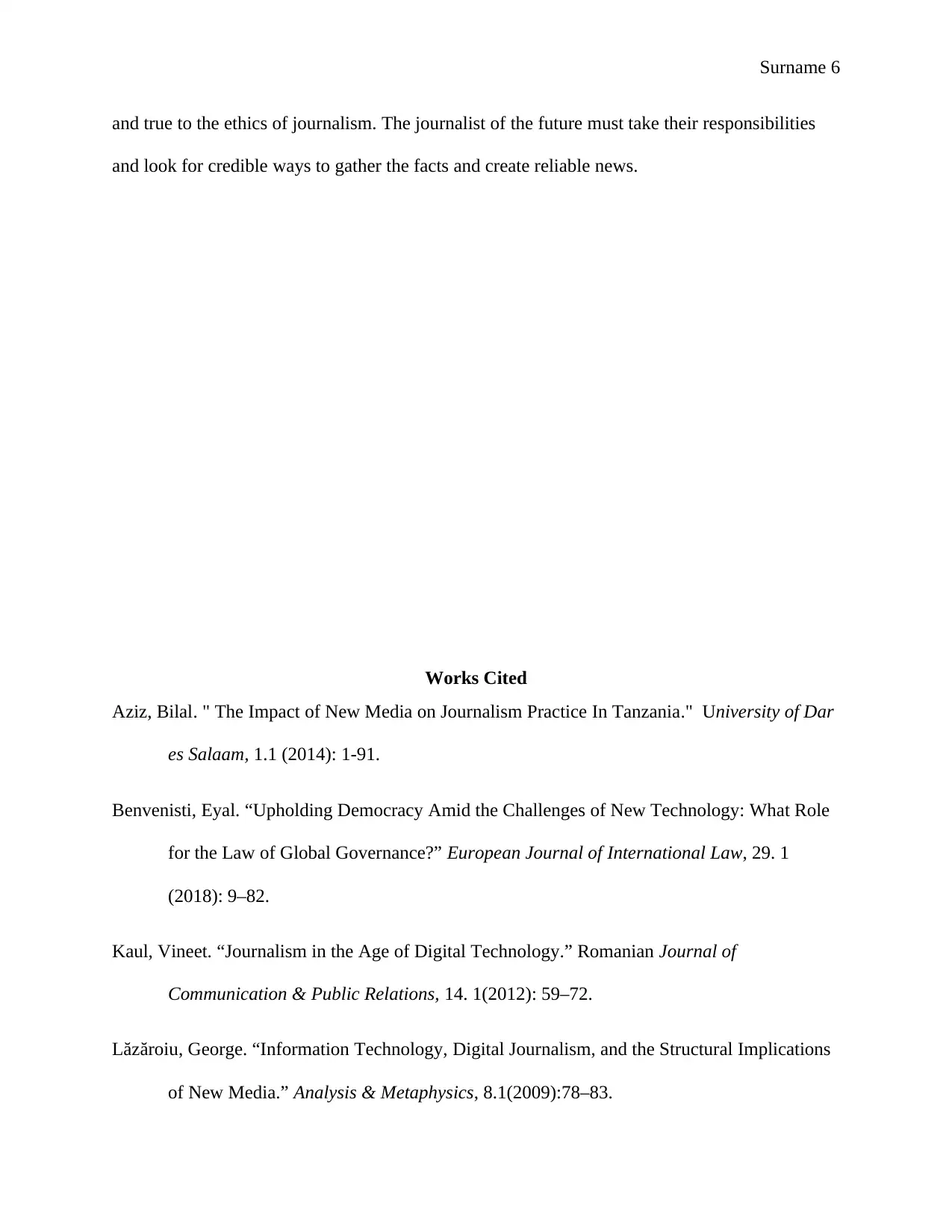
Surname 6
and true to the ethics of journalism. The journalist of the future must take their responsibilities
and look for credible ways to gather the facts and create reliable news.
Works Cited
Aziz, Bilal. " The Impact of New Media on Journalism Practice In Tanzania." University of Dar
es Salaam, 1.1 (2014): 1-91.
Benvenisti, Eyal. “Upholding Democracy Amid the Challenges of New Technology: What Role
for the Law of Global Governance?” European Journal of International Law, 29. 1
(2018): 9–82.
Kaul, Vineet. “Journalism in the Age of Digital Technology.” Romanian Journal of
Communication & Public Relations, 14. 1(2012): 59–72.
Lăzăroiu, George. “Information Technology, Digital Journalism, and the Structural Implications
of New Media.” Analysis & Metaphysics, 8.1(2009):78–83.
and true to the ethics of journalism. The journalist of the future must take their responsibilities
and look for credible ways to gather the facts and create reliable news.
Works Cited
Aziz, Bilal. " The Impact of New Media on Journalism Practice In Tanzania." University of Dar
es Salaam, 1.1 (2014): 1-91.
Benvenisti, Eyal. “Upholding Democracy Amid the Challenges of New Technology: What Role
for the Law of Global Governance?” European Journal of International Law, 29. 1
(2018): 9–82.
Kaul, Vineet. “Journalism in the Age of Digital Technology.” Romanian Journal of
Communication & Public Relations, 14. 1(2012): 59–72.
Lăzăroiu, George. “Information Technology, Digital Journalism, and the Structural Implications
of New Media.” Analysis & Metaphysics, 8.1(2009):78–83.
⊘ This is a preview!⊘
Do you want full access?
Subscribe today to unlock all pages.

Trusted by 1+ million students worldwide
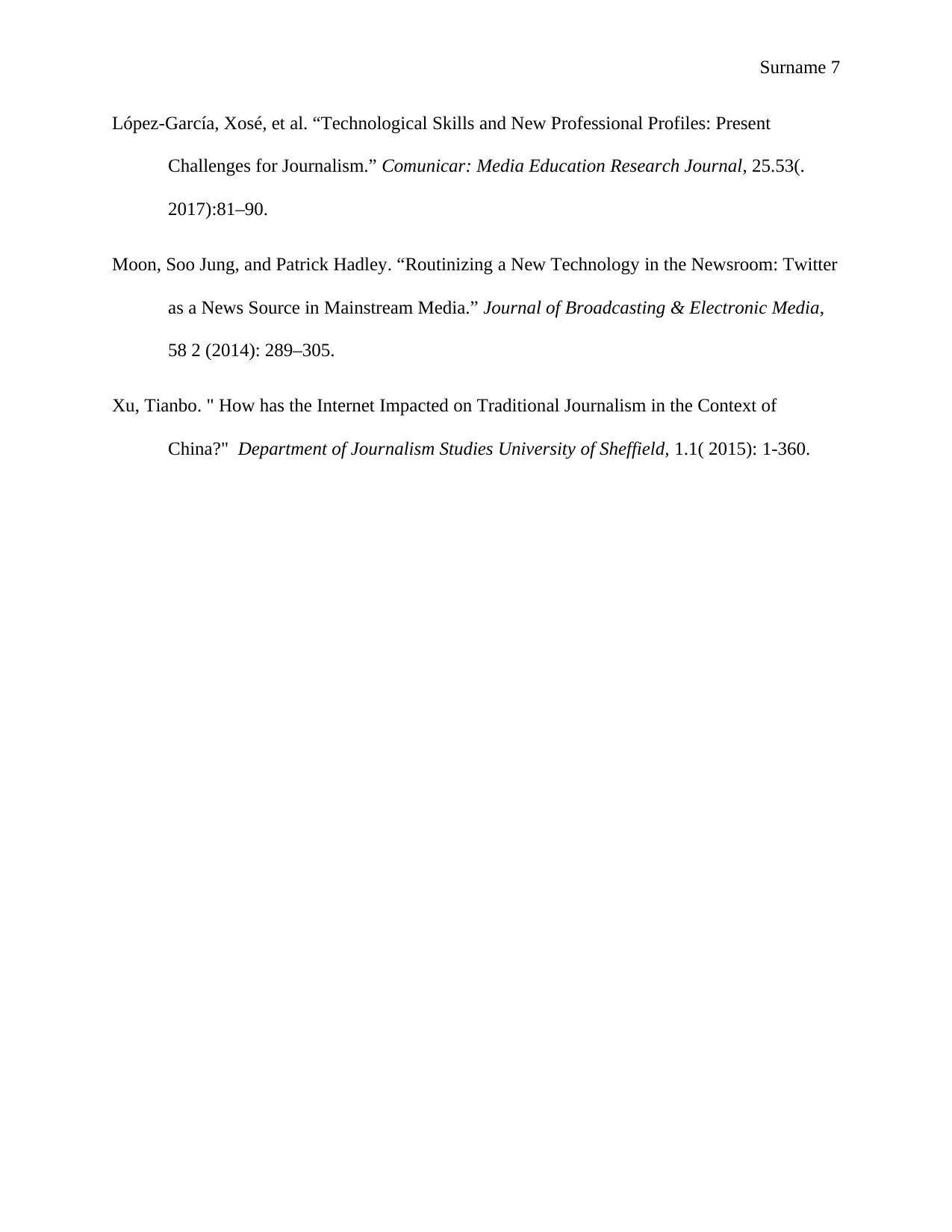
Surname 7
López-García, Xosé, et al. “Technological Skills and New Professional Profiles: Present
Challenges for Journalism.” Comunicar: Media Education Research Journal, 25.53(.
2017):81–90.
Moon, Soo Jung, and Patrick Hadley. “Routinizing a New Technology in the Newsroom: Twitter
as a News Source in Mainstream Media.” Journal of Broadcasting & Electronic Media,
58 2 (2014): 289–305.
Xu, Tianbo. " How has the Internet Impacted on Traditional Journalism in the Context of
China?" Department of Journalism Studies University of Sheffield, 1.1( 2015): 1-360.
López-García, Xosé, et al. “Technological Skills and New Professional Profiles: Present
Challenges for Journalism.” Comunicar: Media Education Research Journal, 25.53(.
2017):81–90.
Moon, Soo Jung, and Patrick Hadley. “Routinizing a New Technology in the Newsroom: Twitter
as a News Source in Mainstream Media.” Journal of Broadcasting & Electronic Media,
58 2 (2014): 289–305.
Xu, Tianbo. " How has the Internet Impacted on Traditional Journalism in the Context of
China?" Department of Journalism Studies University of Sheffield, 1.1( 2015): 1-360.
1 out of 7
Related Documents
Your All-in-One AI-Powered Toolkit for Academic Success.
+13062052269
info@desklib.com
Available 24*7 on WhatsApp / Email
![[object Object]](/_next/static/media/star-bottom.7253800d.svg)
Unlock your academic potential
Copyright © 2020–2026 A2Z Services. All Rights Reserved. Developed and managed by ZUCOL.




